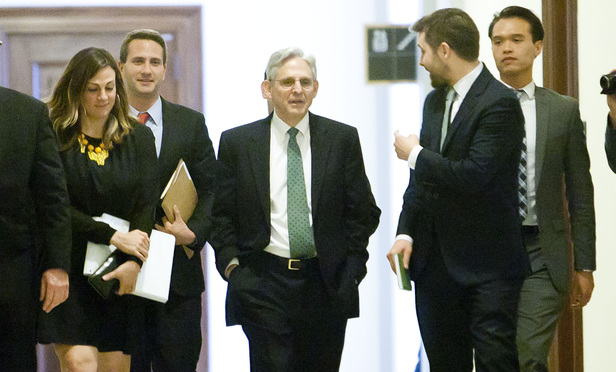As a consequence of his Supreme Court nomination, Chief Judge Garland will cease participating in cases and matters but will continue with his administrative duties as chief judge and as a member of the Judicial Conference of the United States.
Garland won’t be assigned to any new cases and won’t participate in cases that he heard before he was nominated. Garland heard arguments in 42 cases during the current term, which began in September and will end in May; the court generally does not hear arguments from June to August. The court has yet to rule in 15 of Garland’s cases. Garland last sat for arguments on Feb. 8, according to court’s calendar.
A court official said Garland will keep his clerks and that they are staying busy. Details of what the clerks will do on a day-to-day basis if the judge is no longer handling cases were not immediately available. Garland has long been a top feeder judge of clerks to the Supreme Court.
Garland was confirmed to the D.C. Circuit in 1997 and has been chief judge since 2013. Although the court said that Garland would continue his administrative duties as chief judge, he will no longer review judicial misconduct complaints, according to a court official. The chief judge of the circuit reviews misconduct complaints but has discretion to disqualify himself or herself, according to court rules.
Garland, whose salary this year is $215,400, will keep his full salary and benefits.
The chief judges of each of the federal circuits are members of the Judicial Conference, which serves as the policymaking arm of the federal judiciary. The conference traditionally meets twice a year, in September and March.
As the NLJ previously reported, judges nominated to the Supreme Court historically have stopped hearing arguments, although some continued to issue opinions and participate in cases that they heard before being nominated.
Senate Republicans have vowed to not hold any hearings, let alone a vote, on Garland’s nomination. Garland’s statement on Thursday did not address the possibility of an unusually long waiting period, at least compared to some of his recent predecessors. The last four justices appointed from the D.C. Circuit—Chief Justice John Roberts Jr., Justices Clarence Thomas and Ruth Bader Ginsburg, and the late Justice Antonin Scalia—waited three months at most to be confirmed.
An earlier version of this story included two pieces of information provided by the D.C. Circuit that the court later clarified. The statement about Garland’s caseload did not come from Garland himself, it came from the court. Garland will continue to serve as chief judge but officials clarified that he will no longer review judicial misconduct complaints.





